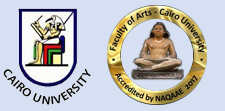عنوان المقال عربي
المرأة القناع في الشعر القديم: الفخر بالکرم والشجاعة أنموذجا
Document Type
Editorial
Keywords English
Woman, Classical Arabic poetry, Masking
كلمات مفتاحية عربي
المرأة, القناع, الشعر العربي القديم
Abstract English
This Study deals with the discourse of pide in classical Arabic poetry as manifested in two main themes, namely generosity and courage, in which woman appears as a mask to conceal whatever discontent poets feel towards some of the tenents and moral values of Arabic culture. Because man is preferred to woman in Arabic customs, he has her a ride to vent his feelings of the pressure of those values on himself never tired of wealth and love for life and survival. This study utilizes an analytical approach in the treatment of poetic texts and in looking at some anecdotes and accounts describing the position of women in Arabic culture, which is the basis for this masking revealed in the poetic discourse of pride .
الملخص العربي
يتناول هذا البحث الموسوم بـ(المرأة القناع في الشعر القديم: الفخر بالكرم والشجاعة أنموذجا) خطاب الفخر في الشعر العربي القديم، في غرضين من أهم أغراضه هما الكرم والشجاعة، تظهر فيهما المرأة قناعا لما يضمره الشعراء في أنفسهم من ضجر ببعض مسلمات الثقافة العربية، مما يدخل في باب القيم الأخلاقية. ولأن الرجل يفضل المرأة في العرف العربي فقد جعل منها مطية للتنفيس عما يحسه من ضغط تلك القيم على نفسه الطامعة أبدا بالمال، والمحبة للحياة والبقاء. ويستخدم البحث المنهج التحليلي في معالجة النصوص الشعرية وفي النظر إلى الأخبار التي تصف موقع المرأة في الثقافة العربية، وهي ما أسس لهذا التقنع الذي كشف عنه خطاب الفخر خاصة. وقد خلصت الدراسة إلى نتائج تتلخص في اتفاق الشعراء على استخدام المرأة قناعا لما يضمرون، مع تباينهم في اختيار وظيفة المرأة كلّ بحسب موقعه الاجتماعي ومكانته، ومنزلة المرأة منه قربا وبعدا.
Recommended Citation
Al-Mutairi, Hind bint Abdul Razzaq
(2020)
"Woman As A Mask in Classical Arabic Poetry: Pride in Generosity and Courage As A Model,"
Journal of the Faculty of Arts (JFA): Vol. 80:
Iss.
2, Article 9.
DOI: https://doi.org/10.21608/jarts.2020.100121
Digital Object Identifier (DOI)
10.21608/jarts.2020.100121
Accept Date
2019-05-02
Publication Date
4-1-2020

